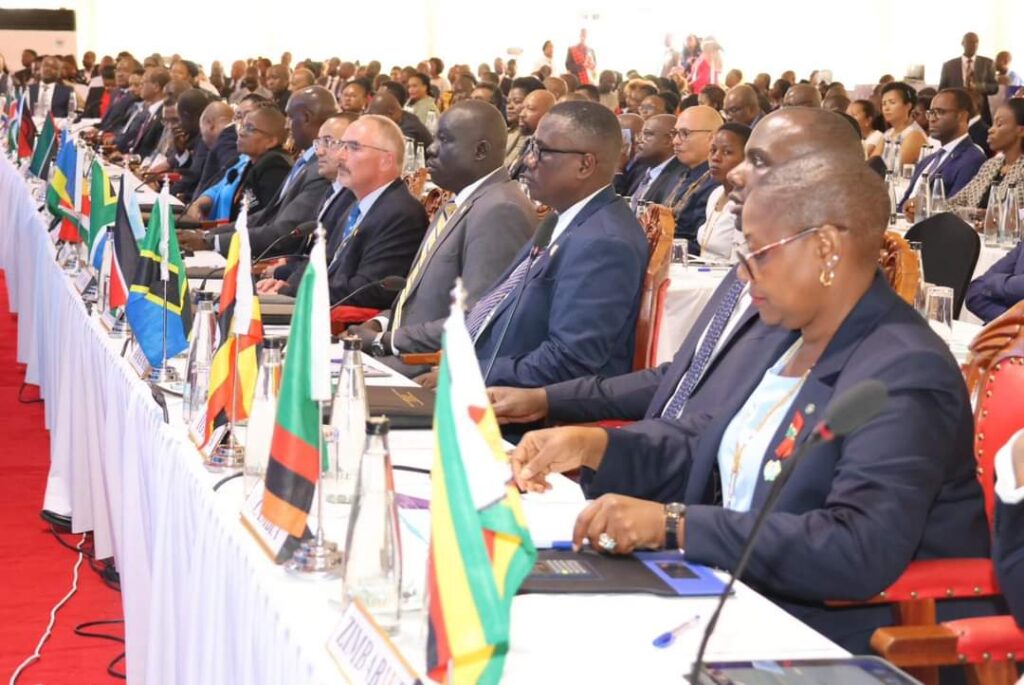BY SHABAN OMAR
Treasury and Economic Planning Cabinet Secretary John Mbadi has urged member states of the Eastern and Southern Africa Anti-Money Laundering Group (ESAAMLG) to harness advanced technology and make substantial investments to combat money laundering and terrorism.
Mbadi said terrorism has disrupted the global order and threatened peaceful coexistence in the ESAAMLG region.
He said terrorist financing poses a significant challenge due to its complex methods, diverse channels, and sophisticated mobilization mechanisms.
Mbadi said along with other emerging threats, terrorism has contributed to a situation he termed a “perfect banality of evil.
The CS said by harnessing advanced technology and dedicating substantial resources, member states can more effectively address the financial dimensions of the threats and enhance regional security.
“While governments are increasingly focused on deploying advanced tools and modern technologies to combat terrorist threats, it is essential that we also invest in understanding how these threats are financed,” he said.
Mbadi spoke during the 24th Meeting of the Eastern and Southern Africa Anti-Money Laundering Group (ESAAMLG), Council of Ministers.
This year’s theme was dubbed ‘Public Private Sector Dialogue, Leveraging Technology and Harnessing Collaboration in Countering Terrorist Financing”.
Mbadi emphasized the need for robust cooperation to harness the positive aspects of emerging technology in combating organized crime, money laundering, and terrorism financing.
He observed that terrorist financiers are continually exploiting technological advancements and vulnerabilities to further their malicious agendas.
The CS said working closely will help member states formulate frameworks and procedural standards to effectively disrupt terrorist networks and enhance regional security.
Mbadi also took the opportunity to commend the Council of Ministers for their steady guidance and leadership of ESAAMLG.
He highlighted that the gathering of esteemed ministers from across member states demonstrates crucial political goodwill and support, which are essential in the fight against money laundering and the financing of terrorism.
Mbadi urged all delegates to engage actively in the PPSD discussions, deepen their understanding of the financial aspects of terrorism, and recommend the effective implementation of Financial Action Task Force standards adding that it is crucial for disrupting terrorist networks and bolstering regional security.
He acknowledged the FATF’s commitment to preventing and combating money laundering and terrorist and proliferation financing in the Eastern and Southern Africa Region.
Mbadi said as part of their commitment to strengthening the implementation of FATF Standards in the region, they have developed ESAAMLG’s sixth Strategic Plan (2024/2025 – 2026/2027).
He said the plan aims to build on the successes and lessons learned from the Fifth Strategic Plan by refining our priorities, objectives, and activities to better address the challenges and enhance their effectiveness.
Mbadi mentioned that implementing the Sixth Strategic Plan requires sufficient resources adding that the organization needs to be adequately funded to operate effectively and fulfill its commitments within the global network.
“Our organization requires sufficient funding to operate effectively and meet our commitments within the global network,” he said.
He said it is also crucial that Anti-Money Laundering, Combating the Financing of Terrorism, Combating the Proliferation Financing activities in respective countries are well-resourced to help address the strategic deficiencies identified in anti-money laundering and counter-terrorist financing regimes, which pose risks to the integrity of the financial system and the safety of citizens.
Additionally, Mbadi said proper resourcing will help avoid the FATF Greylist, which has negatively impacted some of the region members.
Mbadi, who is also the outgoing president of the ESAAMLG council of ministers, said 50% of 12 African countries who are under increased monitoring also known as greylist come from the region.
He noted that when Kenya assumed the presidency of ESAAMLG, they faced a challenging situation where, five of the member countries—Mozambique, South Africa, South Sudan, Tanzania, and Uganda—were intensifying their efforts to address deficiencies in their AML/CFT/CPF systems and to remove themselves from the FATF Greylist.
He stated that Namibia and Kenya were also working on their Post-Observation Progress Reports (POPRs).
Mbadi revealed that Uganda made significant progress and successfully left the Greylist in February 2024 reflecting its efforts to strengthen its AML/CFT regime and address the strategic deficiencies identified by the FATF in February 2020.
He, however, said while celebrating Uganda’s exit from the Greylist, Namibia and Kenya joined the Greylist in February 2024, effectively replacing Uganda.
Mbadi said it is encouraging that both countries have demonstrated high-level political commitment to working with FATF and ESAAMLG to improve their AML/CFT regimes despite the challenges.


